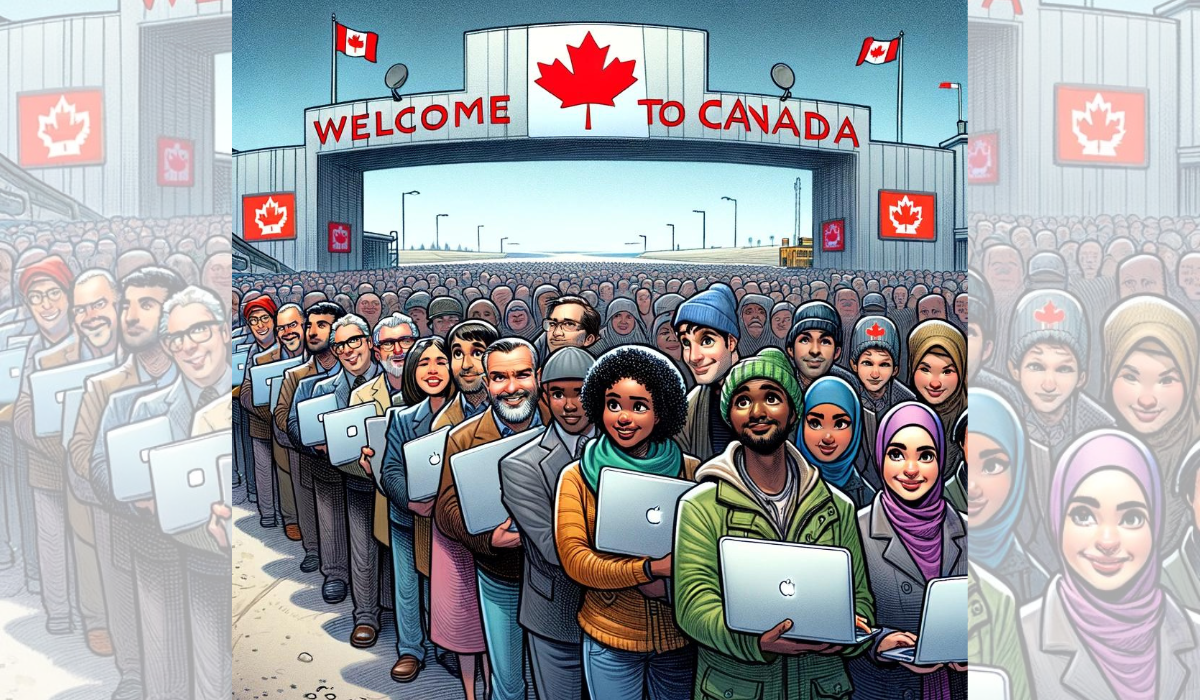Joshua M. Pearce, Western University
Federal immigration minister Marc Miller recently announced the government is implementing a two-year cap on the number of international students admitted into Canada.
This comes amid the government’s broader changes to the immigration system to streamline the types of people who can settle in Canada. Last year, Immigration, Refugees and Citizenship Canada introduced category-based draws for permanent residence applicants. The new requirements are designed to prioritize applications from health-care and STEM professionals, and other in-demand workers.
While Canada has plans to welcome 485,000 permanent residents this year, these recent policy shifts signal the government wants to restrict the type of people who can come here.
However, does Canada’s immigration system unfairly exclude the people who could make meaningful contributions to our society and economy?
Immigration policies favour the rich
Governments, businesses and universities might be tempted to roll out the red carpet for richer immigrants who bring their wealth to Canada and benefit the country by simply spending their money here. However, policy should be focused on attracting smart and innovative people, regardless of their net worth, as they are far more valuable in the long term.
Research shows that skilled workers boost the productivity of their local peers. It is also well known that immigrants play an important role in creating value for firms and can also attract foreign companies to a country.
Research from the United States indicated that more than 25 per cent of tech companies established between 1995 and 2005 had an immigrant as a key founder. Similarly in Canada, semi-skilled and high-skilled immigration have a positive effect on our economic growth.
Canada has a number of immigration streams. Perhaps the most straightforward is Canada’s investor visa, which allows foreign entrepreneurs to gain permanent residency and, eventually, citizenship. Immigration programs like Express Entry require applicants to demonstrate they have a minimum amount of money. Others like the skilled worker program favor those who have attained certain levels of higher education.
This means that current immigration policy can often favor the rich because it is easier to assess a person’s bank statements than it is to assess their talents or intelligence.
Despite Canada’s points-based system that ranks potential immigrants, smart, capable people can easily fall through the cracks if they don’t meet financial, employment or formal educational requirements. These are people who lack the money and educational certificates to earn a lot of immigration points.
Yet some of them may have already created millions of dollars of value with their contributions to open source (OS) technology that you and I use every day.
Open source to the rescue
A new study by my colleague Jun-Yu Qian from Western University and I shows that there is another way to find the value of contributions of people wishing to come to Canada. Immigrants could be assessed based on their contributions to open source development.
Free and open source software (FOSS) refers to programs that can be used, studied, copied, modified and redistributed with few or no restrictions. The core idea of open source development is that if you make an improvement in software or hardware, you must share it back with the community. The result is often rapid churn in innovation in a wide array of areas.
Open source tech developed by people from all over the world has enormous impact on the economy. Today, open source software is in supercomputers, 90 per cent of cloud servers, 82 per cent of smartphones and most artificial intelligence.
More than 90 per cent of Fortune 500 companies use the open-source software. To put it plainly, if you use the internet, you use open source technology every day.
On the hardware side, there are now millions of free designs that consumers can download and 3D print or digitally manufacture to save money compared to conventionally manufactured products.
In our paper, we calculated the value on an individual open source project based on how many times it was downloaded and multiplied that by what the substituted cost is on the open market. Similarly, we calculated the fraction of the total value an individual contributor made to a massive collaboration project, like Linux, Android, Arduino or RepRap.
We found that even modest contributions to open source technology can result in substantial value and high societal return on investments. These values could be used to determine the contribution an individual has made to open source tech development when assessing their ability to live in and support themselves in Canada.
Investing in immigrants
Studies have shown how immigrants are consistently providing positive return on investment for their adoptive countries. Simply put: immigrants bring more economic value than they cost.
In the study, we found the median contributor to Open Office (a free office suite that can replace Microsoft’s offerings) made only a tiny contribution to the code (0.00716 per cent) but provided significant financial savings.
The mechanisms we introduced could serve as tools to utilize contributions by potential immigrants. Making this kind of change to immigration policy would go some way to benefiting smart people willing to work hard and make open source contributions, and the countries lucky enough to attract them.
With the help of the open source development, countries like Canada can widen the net and attract highly innovative people to come and live here, even if they don’t have the formal qualifications.
Joshua M. Pearce, John M. Thompson Chair in Information Technology and Innovation and Professor, Western University
This article is republished from The Conversation under a Creative Commons license. Read the original article.



